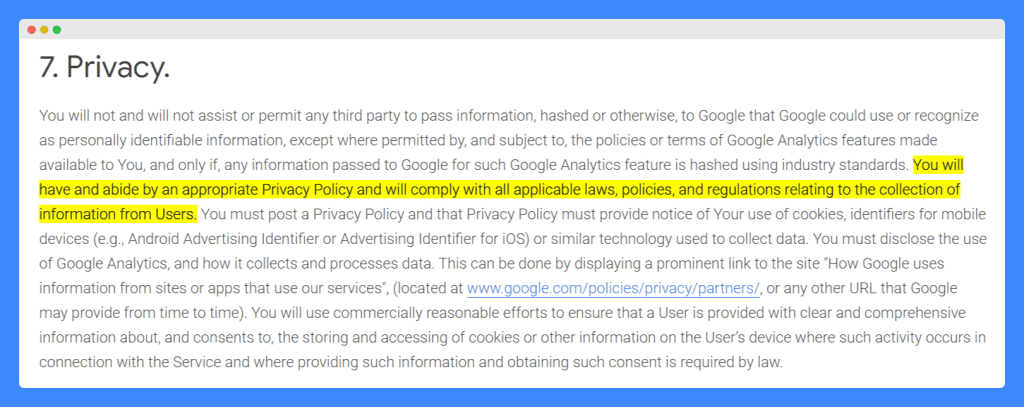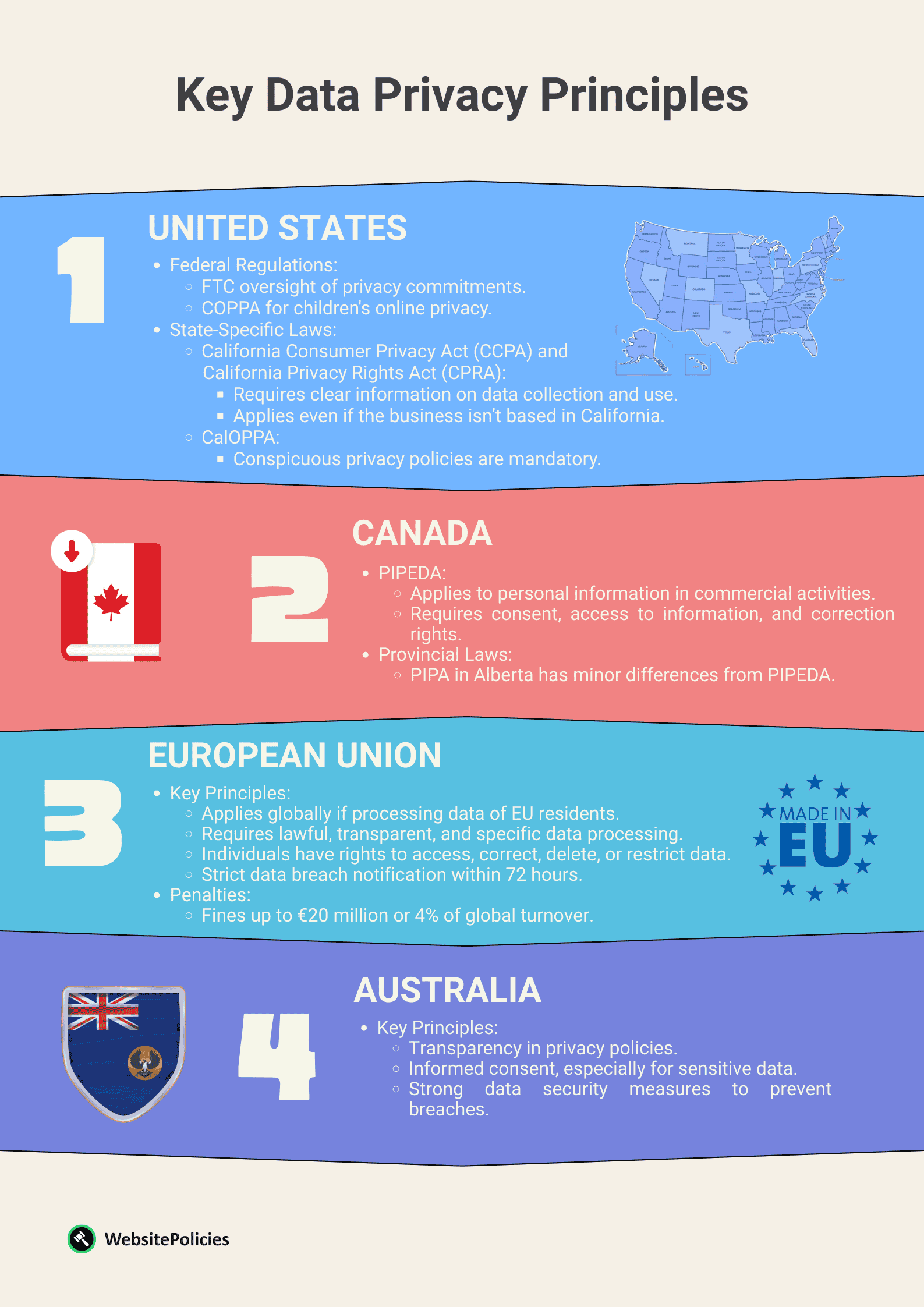A privacy policy isn’t just a legal document – it’s a commitment. From simple email addresses to complex payment information, what you do with that data matters more than you may think.
This article explores the essential nature of privacy policies for anyone running a website, app, or online business. I’ll answer questions such as what is a privacy policy, its purpose, the legal consequences of failing to have one, and much more.
It’s a definitive guide for anyone concerned with data privacy, respecting privacy rights, transparency, and building trust with their users and customers.
- Privacy policies are essential for all online businesses, ensuring legal compliance, transparency, and user trust in data handling.
- A comprehensive privacy policy should cover the types of information collected, how it’s used, security measures, user rights, and more.
- Failing to provide a privacy policy can result in fines, user mistrust, and legal consequences across various jurisdictions.
Table of Contents
PRO TIP: Take the hassle of writing your own privacy policy away with our privacy policy generator trusted by over 200,000 businesses. It’ll save you hours of work and possible costly legal mistakes.
What is a Privacy Policy?
A privacy policy is a document that explains how a company or organization gathers, stores, and uses personal information. Think of it as a commitment to your users about how their personal information will be treated.
If you’re running a website or app, you’re likely collecting personal information from your users.
This could be as simple as email addresses for newsletters or as complex as payment information for e-commerce transactions. What you do with that information, and how you protect it, is where the privacy policy comes into play.
The purpose of a privacy policy is to enhance transparency, build trust, and ensure compliance with data privacy laws and regulations.
Failing to provide a privacy policy can result in fines, user mistrust, and legal consequences across various jurisdictions.
PRO TIP: I want to emphasize that a privacy policy isn’t optional. It doesn’t matter if you run a simple blog or a large e-commerce business – you need a privacy policy. Privacy policies are required for all website owners and mobile app developers.
Who Needs to Have a Privacy Policy?
You might be surprised to learn that it’s not just big corporations who privacy laws apply to. If you run a website, blog, app, or any online platform that collects user information, a privacy policy applies to you.
Let’s look into the specific scenarios and see how they fit into various aspects of online services and content publishers that may be involved in the processing of personal data.
Bloggers
If you’re a blogger, you might wonder why a privacy policy would apply to you. Even if you’re not selling products or services, you’re likely collecting some form of personal information from your readers.
This could include email addresses for newsletters, comments, or analytics to understand your readers’ behavior.
E-commerce Platforms
Running an e-commerce platform? You’re undoubtedly handling a lot of sensitive information, including customer names, addresses, and credit card details.
I want you to recognize that a privacy policy isn’t just a legal must-have in this context – it’s a critical aspect of your customer relationship.
Mobile Apps
Mobile apps are part of our everyday lives, and if you’re an app developer, the responsibility of protecting user data falls on your shoulders. Even basic apps often collect personal information such as user names, locations, and preferences.
Note that Apple Store and Google Play Store both require all apps to have a valid privacy policy. Not having one can result in your app being suspended so keep that in mind.
Software as a Service (SaaS) providers
SaaS providers often deal with a wide variety of data, some of which may be highly sensitive even if you don’t realize it at first.
If this is your field, I want to stress the importance of having a robust privacy policy to outline the types of data collection, data processing, and data use practices, amongst other important things.
All Other Websites and Online Services
All websites, regardless of their size or purpose, often collect some form of personal information. Having a privacy policy tells your readers that you value their privacy.
I strongly advise you to consider this not as a mere legal formality but as a mark of professionalism and respect for your audience and their privacy rights.
You need to remember that even if you don’t ask your users to provide anything, your hosting server may still be collecting certain types of information automatically which makes privacy notice essential.
Reasons to Have a Privacy Policy
There are many reasons to have a solid privacy policy. Whether adhering to legal obligations, fulfilling third-party requirements, or building transparency and trust with your audience, the reasons are numerous and impactful.
Let’s explore 3 of these aspects in detail so you can fully understand their significance.
Legal Obligations
Legal obligations are one of the most compelling reasons to have a privacy policy. Many jurisdictions around the world require privacy statements to be easily accessible.
I want you to understand that this isn’t just a bureaucratic requirement – it’s a legal framework designed to protect the data privacy rights of individuals.
In the United States, for example, laws like the California Consumer Privacy Act set specific requirements for how businesses must handle personal data.
Non-compliance isn’t a minor issue. Failing to meet legal obligations can lead to hefty fines and legal actions. It can also significantly damage your reputation.
PRO TIP: Having a privacy policy that is compliant with the laws applicable to your audience can help you avoid legal troubles and uphold a standard of responsibility and ethics in your business practices.
Third-Party Obligations
The obligation to have a privacy policy doesn’t stop with governmental regulations. You must also consider third-party obligations. Let me explain what that means for you.
If you use third-party services like advertising platforms, payment processors, or analytics tools, these often come with their own requirements.
For example, if you’re using Google Analytics to track user behavior on your site, Google requires you to have a privacy policy that discloses this use.

These obligations aren’t something you can overlook. Failing to comply can result in suspension or termination of these essential services, disrupting your operations and possibly leading to a loss of revenue.
I strongly advise you to thoroughly review the terms and conditions of any services you use. Ensure that your privacy policy aligns with their requirements and clearly discloses how you’re using these services.
It’s not just about ticking a box – it’s about maintaining a harmonious relationship with these providers and, by extension, ensuring a smooth experience for your users.
PRO TIP: Third-party compliance is integral to the seamless running of your online business or content platform, and it reinforces your credibility and trustworthiness in the eyes of both your users and your business partners.
Transparency and Trust
It goes without saying that transparency and trust are essential in the world of online businesses and publishers. Having a privacy policy plays a key role in maintaining these values.
I want you to see your privacy policy not merely as a legal document but as a way to communicate openly with your users or readers.
By clearly stating what information you collect, how you use it, and whom you might share it with, you’re pulling back the curtain and allowing your users to see how their data is handled.
Imagine yourself as a user. Wouldn’t you feel more comfortable providing your information if you knew exactly how it was going to be used? A comprehensive and transparent privacy policy can turn a legal obligation into a way to build customer trust.
PRO TIP: A detailed privacy policy shows your commitment to ethical practices and can enhance your reputation and credibility among your users. It’s a win-win for you and your audience.
Legal Requirements for Privacy Policy
Navigating the legal landscape of privacy regulations can be challenging. It’s not an easy task to address requirements across geographical boundaries and legal nuisances when laws differ quite a bit.
In this section, I’ll give a brief overview of 4 major jurisdictions that require privacy policies: the United States, Canada, the European Union, and Australia. Let’s take a closer look.

United States
In the United States, privacy laws can vary widely from state to state, but there are common federal privacy laws and state-specific regulations you should be aware of.
Firstly, let’s talk about the Federal Trade Commission (FTC). They enforce violations of privacy commitments. If you state something in your privacy policy and fail to uphold it, the FTC can step in.
This also includes children’s online privacy with the available Children’s Online Privacy Protection Rule (COPPA) applicable to online services that may collect any personal information from children.
Now, considering state laws, the California Consumer Privacy Act (CCPA) and the more recent California Privacy Rights Act (CPRA) are particularly noteworthy. In short, they mandate that you provide detailed information about data collection and use.
California Online Privacy Protection Act (CalOPPA) requires any business collecting personally identifiable information from California consumers to also feature a conspicuous privacy policy on its website.
This policy must detail the categories of information collected, the third parties with whom it’s shared, and how consumers can review and change the information collected.
If your business serves California residents, even if you’re not based in California, you must comply with their regulations. Penalties for non-compliance can be severe and are something you certainly want to avoid.
Canada
Canadian privacy law is another vital area for online businesses to understand. In Canada, the Personal Information Protection and Electronic Documents Act (PIPEDA) governs how businesses must handle personal information that could be used to identify an individual.
PIPEDA applies to private-sector organizations that collect, use, or share personal information in the course of commercial activities. If your business deals with Canadian customers, it’s essential to comply with this law.
PIPEDA requires you to obtain an individual’s consent when you obtain someone’s personal information. You must also provide them access to their information and allow them to challenge its accuracy.
Canada also has different provincial laws that apply such as the Personal Information Protection Act (PIPA) in Alberta. This law aligns closely with PIPEDA but has some minor differences.
Compliance with PIPEDA involves creating a privacy policy that clearly outlines how personal information is collected, used, and disclosed. You must also designate an individual responsible for ensuring compliance with these principles.
I recommend that you carefully review your practices to ensure alignment with PIPEDA and any relevant provincial laws. Non-compliance could lead to complaints, legal actions, and fines.
European Union
Understanding the European Union’s privacy landscape is key for online businesses, especially since the General Data Protection Regulation (GDPR) came into force.
The GDPR represents a significant shift in data protection laws in Europe and it’s something you cannot afford to overlook. It applies to any organization, regardless of location, that processes the personal data of individuals residing in the EU.
What does this mean for you? If you have customers residing in the EU, you must comply with their rules, regardless of where your business is based.
Under the GDPR, personal data must be processed lawfully, transparently, and for a specific purpose. Consent must be freely given, informed, and unambiguous. Be careful not to assume consent but obtain it explicitly.
Additionally, individuals have the right to access, correct, delete, or restrict the processing of their data. This is usually done by submitting a data subject access request.
You must also implement adequate security measures to protect personal data and notify the authorities and affected individuals of any data breaches within 72 hours.
Protection laws in Europe cover a wide range of details so I strongly advise you to evaluate your data processing activities and ensure they align with EU’s requirements.
This might include updating your privacy policy, implementing proper consent mechanisms, and possibly appointing a Data Protection Officer if required.
Non-compliance with the GDPR can lead to severe penalties, up to €20 million or 4% of your global annual turnover, whichever is higher.
Australia
The Australian privacy landscape is another essential area to cover, especially for businesses that may interact with Australian customers.
The Privacy Act 1988 is the primary law governing privacy in Australia, and it includes the Australian Privacy Principles (APPs), which apply to most businesses and government agencies.
Transparency and consent are central to the APPs. You’re required to have a clear and comprehensible privacy policy, detailing what information you collect and how you’ll use it.
Consent obtained from individuals must be informed, especially when collecting sensitive information, and they must be able to access their information and request corrections if necessary.
Data security is also emphasized, requiring you to take measures to protect the information that you collect from unauthorized access or disclosure.
Penalties and fines can reach up to AUD$10 million for corporations or AUD$2.1 million for individuals, for serious breaches of privacy, data mishandling, or failure to comply with privacy obligations.
What Does a Typical Privacy Policy Contain?
The clauses you write in your privacy policy will depend upon the applicable laws and may vary depending on your location and industry.
However, since privacy policy is a legal statement that’s rather common, there are certain elements that will be present in pretty much all of them regardless of geographical boundaries and legal jurisdictions.
Here’s a quick breakdown of what you’ll usually find:
- It outlines what information your company collects. Examples of personal information include basic things like names and email addresses to more sensitive data like credit card details.
- It describes how you use this information. Are you using email addresses for newsletters? Will you be sharing information with third parties? You need to provide detailed explanations.
- It explains the security measures in place to protect this information. Your customers must know that their data is safe.
- It informs website visitors and app users about their rights regarding their data. This includes how they can request access to, or deletion of, their information.
- It informs about the tracking technologies like cookies, pixels, and beacons, how they work, and what data they may collect. It’s also common to have a separate cookie policy in addition to your privacy policy to cover these.
- It clarifies if the platform is available to children under the age of 13 and explains how parents can have control over their personal information.
- It provides accurate contact information in case someone has questions or concerns about your data privacy practices.
Of course, there’s a lot more that goes into it and your final policy will depend upon many different factors.
Don’t forget that applicable laws may change over time so you may need to address requirements of any new regulations and update your policy.
Limitations of Privacy Policies
When discussing the limitations of privacy policies, it’s essential to recognize that while they serve as legal protection and a guide for users, they are not a cure-all for privacy concerns.
I can tell you that its effectiveness is often determined by the contents of a privacy policy, and how well it’s drafted and enforced.
A poorly drafted policy, filled with jargon and legalese, may fail to communicate to your users how their information is being used. This can lead to misunderstandings and even legal issues.
Another limitation is the enforcement of the privacy policy. If you don’t follow your own rules, you may find yourself in hot water legally. Compliance is not just about having the rules but living by them.
Finally, it won’t protect against all data breaches or unauthorized access. A privacy policy is a statement, not a security measure. You must combine an effective privacy policy with robust cybersecurity measures to ensure your users’ data is truly secure.
If possible, incorporate privacy and data protection principles into your operations from the start by implementing technical and organizational measures during the initial stages of your website or mobile app development.
PRO TIP: While a privacy policy outlines and informs users how you intend to use their information, it does not in itself protect that information from cyber threats or misuse.
Failure to Provide a Privacy Policy
Failure to provide a privacy policy can lead to serious consequences for you. It’s not merely a suggestion but a law in many jurisdictions.
Should you fail to meet this requirement, you may not only lose the trust of your users but also face significant fines. Depending on the jurisdiction and the nature of the violation, these fines can be substantial.
This is an investment in your users’ trust and a safeguard against potential legal action. The risk of damaging your reputation and the potential for fines makes this an essential aspect of your online operations.
PRO TIP: Compliance with laws like GDPR or CCPA is not optional, and the penalties are designed to be a real deterrent. I urge you to take the time to ensure that your privacy policy is transparent, accessible, and in line with all relevant legal standards.
How to Create a Privacy Policy?
Now that you’re aware of the importance of having a privacy policy on your website or app, the big question is – how do you create one? You have a few options you may choose from depending on your budget and requirements.
Hire a Lawyer
Hiring a lawyer to draft your privacy policy is the most obvious choice most people think of right away. Engaging an expert can ensure that your policy will be tailored to your business and comply with all relevant laws.
Of course, this is also the most expensive option and in most cases, unless you operate a large corporation or operate in a regulated industry, it’s an unnecessary expense.
Use an Online Generator
There are several reputable online services that can generate a bulletproof privacy policy based on your answers to specific questions. It allows you to get a personalized policy quickly and without breaking the bank.
However, while generally much less expensive than hiring a lawyer, it’s essential to choose a generator that stays current with legal changes and stands behind its products.
Use a Template
Many privacy policy templates are available online, both free and paid. While convenient and cost-effective, templates are generic and might not cover your specific business needs.
You may use one as a starting point but you’ll likely need to put in some time to customize and expand it accordingly to your business and industry needs.
Write It Yourself
If you have a strong understanding of privacy laws that apply to your business, you may choose to write the policy yourself. It will certainly take some time but no one knows your business better than yourself.
This option requires a high level of expertise, so make sure to refer to legal guidelines in your jurisdiction. I generally don’t recommend this option considering there are better choices available.
Regardless of the path you choose, periodic reviews and updates to the privacy policy are necessary to ensure ongoing compliance with evolving laws and regulations.
Frequently Asked Questions
What is a privacy policy?
A privacy policy is a document that outlines how a company collects, uses, and protects the personal information of users.
Who needs to have a privacy policy?
All websites, apps, bloggers, e-commerce platforms, SaaS providers, and other online businesses that collect user information need a privacy policy.
Are privacy policies legally required?
Yes, in most jurisdictions, privacy policies are mandatory, especially if you collect personal information from users.
Why is a privacy policy important?
A privacy policy enhances transparency, builds trust, ensures legal compliance, and shows users that their privacy is valued.
What should a typical privacy policy include?
A comprehensive privacy policy should cover the categories of information collected, how it’s used, security measures, user rights, and tracking technologies.
What happens if you fail to provide a privacy policy?
Failure to provide a privacy policy can lead to user mistrust, significant fines, and legal consequences in various jurisdictions.
Can I use a generic privacy policy?
No, each business is unique, and generic policies may not address specific regulations, leading to potential legal risks.
How can you make a privacy policy for your website or app?
Options include hiring a lawyer, using online generators, using templates, or writing it yourself. The best choice depends on your budget and requirements.



